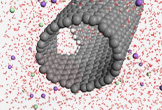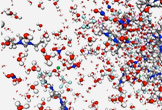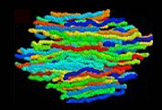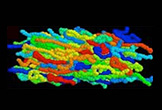Research
Research Field
- Solar Cell
- Batteries
- Hydrogen
- Catalyst / Chemical Reaction Engineering
- Thermodynamics / Transport Phenomena
- Process Design/Analysis
- Polymer/Organic Synthesis
- Biochemical Engineering
- Electrochemistry / Photochemistry
- Computational Science
- Smart Material / Sensor
- Semiconductor
Solar Cell
Dong Suk Kim, Jin Young Kim, Kwanyong Seo, Sang Il Seok, Changduk Yang, JunHee Lee, Sung-Yeon Jang
| RESEARCH FIELD / CONTENTS | |
|---|---|
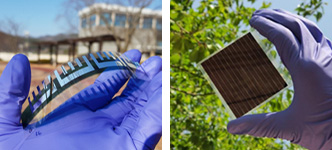 |
Due to a limit in fossil fuels and increasing environmental pollution, along with the rapid increase in energy demand, various technologies are required to produce environmentally-friendly and economical energy sources. Therefore, in the solar cell research of the ECHE, the main focus is the research on how to efficiently use solar energy which is in the limelight as an environment-friendly and unlimited alternative energy source. The research includes various topics from developing new active materials to the state of art engineering of the device structure. The ECHE solar cell research, of course, is a top leader not only in Korea but also worldwide. In particular, the ECHE solar cell research is holding the world record efficiency of Perovskite and quantum dot solar cells. In addition to the research, the graduate program covers all required knowledge on solar cells from basic concepts to practical skills. |
Batteries
Seok Ju Kang, Youngsik Kim, Dong-Hwa Seo, Hyun-Kon Song, Seung Mo Oh, Dong Woog Lee, Hyun-Wook Lee, Ji-Hyun Jang, Kyeong-Min Jeong, Sungkyun Jung, Jaephil Cho, Yunseok Choi
| RESEARCH FIELD / CONTENTS | |
|---|---|
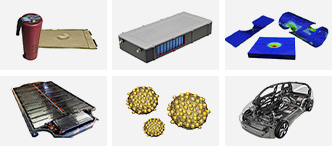 |
Battery technology is an energy storage technology that converts chemical energy into electrical energy using an electrochemical reaction. Batteries are attracting attention as a key technology for the 4th industrial revolution and changes in the energy ubiquitous era. UNIST is conducting research to discover or develop the materials for positive electrode (cathode), negative electrode (anode), liquid electrolyte, and binder, which are the four core elements of lithium-ion batteries that are currently most used. We are covering the multi-length scale research field on batteries from material design with computational science to battery cell, module and pack design including advanced characterization technology. In addition, we are developing sodium battery, seawater battery, metal-air battery, and all-solid-state battery, which are attracting attention as next-generation battery systems. |
Hydrogen
Youngkook Kwon, Jin Young Kim, Jungki Ryu, Jong-Beom Baek, Kwanyong Seo, Hyun-Kon Song, Kwangjin An, Jae Sung Lee, Chang Young Lee, Hankwon Lim, Sung-Yeon Jang, Ji Wook Jang, Ji-Hyun Jang
| RESEARCH FIELD / CONTENTS | |
|---|---|
 |
Hydrogen (H2) is a key component of Net-Zero that can bring carbon neutrality with sustainable industrial development as a clean energy source. School of Energy and Chemical Engineering conducts full-cycle research on hydrogen production, storage and utilization. We are developing photochemical, electrochemical, and high-temperature catalytic reactions for green hydrogen production and developing technologies to utilize ammonia and liquid organic hydrogen carrier (LOHC) for hydrogen storage and transportation, as well as generating electricity using hydrogen in fuel cell systems. In addition, several process prediction models are under development. School of Energy and Chemical Engineering will play an important role in realizing a hydrogen society through future-oriented state-of-the-art technology development. |
Catalyst / Chemical Reaction Engineering
Ja Hun Kwak, Youngkook Kwon, Yong Hwan Kim, Jungki Ryu, Jong-Beom Baek, Hyun-Kon Song, Kwangjin An, Jae Sung Lee, Hankwon Lim, Ji Wook Jang, Ji-Hyun Jang, Jaephil Cho
| RESEARCH FIELD / CONTENTS | |
|---|---|
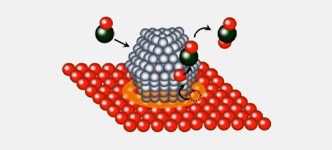 |
Chemical reaction engineering is the forefront research area that can address from a simple molecular reaction to the economical design of chemical reactors for petrochemical processes. The development of new catalysts can impact various areas from environmentally benign petrochemical processes to efficient renewable energy conversions, and to environmental control, thereby leading to a clean energy society. Being the heart of numerous applications, catalysis research is a highly interdisciplinary field exhibiting a plethora of concepts, approaches, and facets. Our research areas include, but are not limited to, heterogeneous, homogeneous, photo-, electro-, and photoelectro-catalysis and chemical reactor design. Synergistic collaborations with theoretical scientists, reaction engineers, and spectroscopists are actively pursued. |
Thermodynamics / Transport Phenomena
Chunggi Baig, Dong Woog Lee, Chang Young Lee, Hankwon Lim, Kyeong-Min Jeong
| RESEARCH FIELD / CONTENTS | |
|---|---|
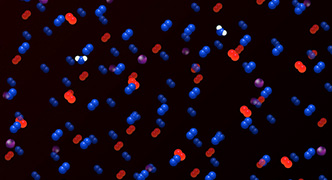 |
Compared to traditional thermodynamic researches mainly dealing with equilibrium systems, recent advanced thermodynamic and statistical mechanical approaches have been attempted to analyze various physical behaviors of complex organic/inorganic materials at nonequilibrium states such as polymeric systems under external flow fields. In conjunction with these nonequilibrium thermodynamic approaches, many theoretical, experimental, and computational studies have been conducted to understand the heat, mass, and momentum transport phenomena for complex fluid systems. In particular, significant advances in methodological development of multiscale computer simulations together with the rapid increase in computing power have recently made it possible to explore the fundamental microscopic molecular origins underlying the general macroscopic physical properties and phenomena of complex polymeric systems, thereby elucidating the structure-property-processing relationships. |
Process Design / Analysis
| RESEARCH FIELD / CONTENTS | |
|---|---|
 |
Process design and analysis performs research to find out optimized design for chemical processes after analyzing them based on chemical engineering principles. The primary research topics include process simulation, process control, process optimization, scale-up, modular design, separation process, computational fluid dynamics, and economic analysis. |
Polymer / Organic Synthesis
Seok Ju Kang, Hyunhyub Ko, Kang Hee Ku, Yong Hwan Kim, Jong-Beom Baek, Chunggi Baig, Changduk Yang, Dong Woog Lee, Jiseok Lee, Sung-Yeon Jang
| RESEARCH FIELD / CONTENTS | |
|---|---|
| The field of polymer and organic synthesis performs a key role in major industries from conventional rubber and plastics to energy, biomedical, and electronics due to their flexible, light, and cost-effective process. The primary research topics at UNIST include organic solar cells, optoelectronic devices, electronic skins, hologram displays, carbon-based materials, bioinspired functional surfaces, smart hybrid nanocomposites, and functional organic compounds. | |
Biochemical Engineering
Donghyuk Kim, Yong Hwan Kim, Sunghoon Park, Sung Kuk Lee
| RESEARCH FIELD / CONTENTS | |
|---|---|
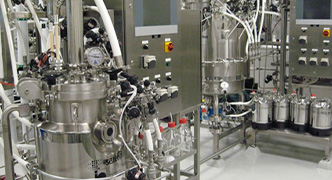 |
Biochemical engineering is the use of biological (natural or organic) materials, such as organisms, cells and certain molecules, to develop products and processes. Industries that depend on biochemical engineering include biotechnology, biofuels, pharmaceuticals, water purification and food. They use biochemical engineering to research, develop and produce materials and products that will benefit society or human well-being. The resulting products are often made of a combination of organic and laboratory-produced materials. These products include: petroleum products such as oil, paint or plastic, food, paper, textiles, cleaning products, personal care products, medications, pesticides. |
Electrochemistry / Photochemistry
Youngkook Kwon, Jungki Ryu, Jong-Beom Baek, Hyun-Kon Song, Seung Mo Oh, Jae Sung Lee, JunHee Lee, Jiseok Lee, Sung-Yeon Jang, Ji Wook Jang, Ji-Hyun Jang, Sungkyun Jung
| RESEARCH FIELD / CONTENTS | |
|---|---|
 |
Many research groups in the UNIST School of Energy and Chemical Engineering study efficient conversion, storage, and utilization of renewable energies based on electrochemistry and photochemistry. The primary research topics include the generation of electricity and chemicals using unlimited solar energy (e.g., solar cell and artificial photosynthesis), effective storage of electricity (e.g., rechargeable batteries and capacitors), and electrosynthesis of useful chemicals (e.g., water electrolysis, CO2 conversion, and ammonia synthesis). These research topics are closely related to the two main strategies for realizing carbon-neutrality―electrification and decarbonization of various sectors. |
Computational Science
Donghyuk Kim, Chunggi Baig, Dong-Hwa Seo, JunHee Lee, Hankwon Lim
| RESEARCH FIELD / CONTENTS | |
|---|---|
| Computational Science is the use of numerical methods or computational modeling to understand and solve complex systems and phenomena. We are conducting the research to understand and predict various systems and phenomena such as batteries, catalysts, solar cells, and chemical processes using computational methods at various time and length scales. | |
Smart Material / Sensor
Seok Ju Kang, Hyunhyub Ko, Kang Hee Ku, Changduk Yang, Dong Woog Lee, Jiseok Lee, Chang Young Lee
| RESEARCH FIELD / CONTENTS | |
|---|---|
| Recent development in areas of internet of Things (IoTs), healthcare, robot, metaverse attract great attention, triggering the development of electronic devices with enhanced userability and functionalities. For the development of next-generation electronics, stimuli responsive, flexible, stretchable, biodegradable, self-healing, and self-powered functionalities are critically required in addition to the durability and performances of sensors and devices. Smart material and sensor group is dedicated to the research in areas of stimuli-responsive materials, functional materials, flexible/stretchable sensors, electronic skin, and wearable electronics based on the fundamental study about polymers, nanomaterials, biomaterials, and semiconductors. | |
Semiconductor
Hyunhyub Ko, Kwanyong Seo, Changduk Yang, JunHee Lee, Chang Young Lee, Ji-Hyun Jang
| RESEARCH FIELD / CONTENTS | |
|---|---|
 |
Semiconductors are a key material that is rapidly in demand with the advent of the 4th industrial revolution. It is a product that accounts for more than 20% of Korea’s exports, and its use is increasing in large quantities in our daily lives, just like the rice we consume every day. It is used as an indispensable element not only for mobile phones and computers, but also for all smart devices that monitor and respond to our lives, such as the Internet of Things, artificial intelligence, and autonomous driving. We are accelerating the development of next-generation semiconductors that can realize ultra-low power consumption and multi-value logic that can mimic the human brain as well as ultra-high-density semiconductors of two-nanometers size with 100Tb density that will emerge in the future. |







